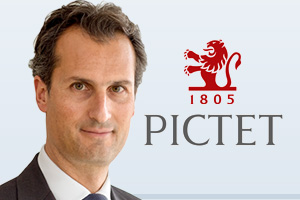
![]() SJB | Korschenbroich, 23.03.2022.
SJB | Korschenbroich, 23.03.2022.
Im Februar 2022 entwickelten sich Umwelttechnologie-Aktien deutlich besser als der breite Markt in Gestalt des MSCI World Index, da sich die Pläne der EU, die Energiewende aufgrund der russischen Invasion der Ukraine zu beschleunigen, positiv auswirkten. Der Ausblick für Aktien aus dem Sektor der Erneuerbaren Energien hat sich somit dauerhaft verbessert. In diesem positiven Marktumfeld generierte der Pictet – Global Environmental Opportunities P EUR (WKN A1C3LN, ISIN LU0503631805) eine Wertentwicklung von -1,77 Prozent auf Monatsbasis und liegt über ein Jahr mit +6,89 Prozent weiter im Plus. Der aktuelle Monatsbericht von Pictet-FondsManager Luciano Diana analysiert für alle Investoren der FondsStrategie SJB Nachhaltig die Veränderungen im Portfolio und liefert einen Ausblick für die Aktienmärkte des Environmental-Sektors.
Market review
Equities ended the month sharply lower for a second time in a row after Russia’s invasion of Ukraine triggered severe Western sanctions, which include blocking Russian banks from the SWIFT global payments system. European equity markets suffered the most while the UK, Latin America, Asia Pacific defied selling pressure and ending slightly higher. IT and Communication were the worst performing sectors after US tech giants reported mixed earnings results. Energy and Material stocks ended higher as oil prices jumped 11 per cent following the Ukraine crisis while Defensive sectors, such as healthcare, staples and utilities, were flat. From an environmental perspective, the Russian invasion brought the question of security of energy supply to the forefront given Europe’s heavy dependence on Russian gas. In response, the European Union is reviewing its energy strategy, where an accelerated renewables build out, energy efficiency measures and tapping alternative gas/LNG sources will be among the top priorities.
Performance analysis
The strategy outperformed the MSCI ACWI during the month of February. Renewable Energy was the strongest contributor to performance as the EU’s strengthened resolve to accelerate the energy transition, which resulted in a structural improvement in the outlook for this industry. Sustainable Agriculture & Forestry also contributed positively, as forestry names like West Fraser benefited from the rapid increase in lumber prices. Energy Efficiency was the largest detractor, where Industrial Efficiency stocks, such as Infineon, Schneider Electric and Keyence, and Building Efficiency stocks, such as Johnson Controls and A.O. Smith, underperformed. These stocks are facing some persistent supply chain headwinds. Waste Management & Recycling and Water Supply & Technologies also detracted, with Republic Services, Smurfit Kappa, Xylem and American Water Works giving back some of the gains made before. Pollution Control detracted slightly – the picture was rather mixed with environmental consulting companies doing well on the back of strong company results (e.g. Tetra Tech, Aecom) whereas Pollution Control companies, such as Ecolab, were negatively impacted by higher raw material costs.
Portfolio activity – overweightings & underweightings
During the month, we added to our positions in Orsted and SolarEdge given stronger structural tailwinds. Within Waste Management & Recycling, we continued to build our position in Stora Enso. Within Energy Efficiency, we took profits from On Semiconductor after very strong results and strong performance last year. We also decreased NXP Semiconductors based on expectations that there could be an upcoming peak in the semiconductor cycle in the second half of the year. We also exited LAM Research and reallocated proceeds to continue building our position in a more attractively scored peer, Tokyo Electron. Within Pollution Control, we increased our position in AECOM while decreasing our positions in Tetra Tech and Ecolab. Finally within Dematerialized Economy, we took profits in Synopsys and Autodesk.
Market outlook
The unfolding of the invasion of Ukraine is deeply troubling and has resulted in a stronger resolve within Europe to accelerate the energy transition. In the near term, the question is to what extent will Russia’s invasion undermine the global economic recovery. Some global industries will be directly affected, but it is the second-round effects on European inflation and consumer confidence that also need to be monitored. Despite near-term headwinds, such as supply chain bottlenecks and rising commodity costs, the fundamental drivers for the environmental theme remain intact. Normalized revenue and earnings growth looks better than before the pandemic thanks to a very supportive global policy while valuations relative to the broader market are in line with historic averages. The recent volatility and spikes in energy prices are likely to further stimulate corporate investments in energy independence as well as technologies aimed at reducing energy and electricity consumption, particularly in Europe. In addition, companies that contribute to a cleaner environment are also likely to see robust demand, for example those in our Pollution Control segment. While our portfolio holdings will not be completely insulated from inflationary input headwinds, they have sufficient pricing power to navigate well in an inflationary environment.
Portfolio strategy
Our strategy remains focused on investing in environmental solutions providers. We believe that exposure to environmental trends offers investors attractive risk-adjusted returns, regardless of the stage of the economic cycle. We favour solutions providers with wide economic moats, robust profitability, healthy balance sheets and business models that don’t rely on government subsidies. These companies are not only likely to weather a difficult economy, but also to perform well during the recovery phase. Our bottom-up investment process results in a concentrated global portfolio with a growth and quality bias. Long term, the trends of population growth and rising living standards are inescapable and so is the growing strain on natural resources. Awareness of environmental issues has grown tremendously in the last few years and is now deep-seated, top of mind for an entire generation of citizens, consumers and investors.
Pictet – Global Environmental Opportunities Management Team
Luciano Diana
Gabriel Micheli
Yi Du



